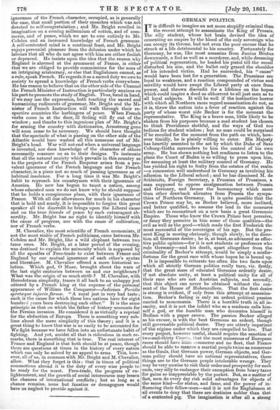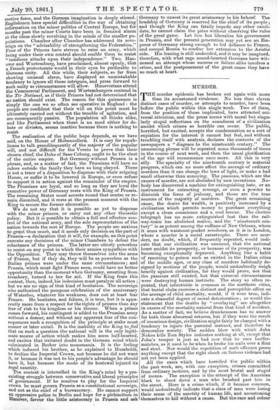GERMAN POLITICS.
IT is difficult to imagine an act more stupidly criminal than the recent attempt to assassinate the King of Prussia. The silly student, whose hot brain devised the idea of cementing an empire by the blood of the only sovereign who can occupy its throne, had not even the poor excuse that he struck at a life detrimental to his country. Fortunately for Germany, he was, like most assassins from Junius Brutus downwards, a fool as well as a murderer, and, while dreaming of political regeneration, he loaded his pistol till the recoil disturbed his aim, and the bullet only grazed the shoulder of his intended victim. Had he succeeded, his "cause" would have been lost for a generation. The Prussians are loyal to weakness, and a reaction compounded of virtue and servility would have swept the Liberal party at once from power, and thrown discredit for a lifetime on the hopes which could inspire a deed as abhorrent to all just men as to all loyal subjects. It will be well if the instinctive horror with which all Northern races regard assassination do not, as it is, throw the nation into a fever of reaction against the party of whose worst side Becker is for the moment the representative. The King is a brave man, little likely to be shaken from his purposes because a mad student has chosen to think Providence slothful, and the ways of God too tedious for student wisdom ; but no man could be surprised if he recoiled for the moment from the path on which, how- ever timidly, he is plainly willing to enter. His Majesty has heartily assented to the act by which the Duke of Saxe Coburg-Gotha surrenders to him the control of his own army. He has shown nothing but readiness to listen to the plans the Court of Baden is so willing to press upon him, for assuming at least the military control of Germany. He has yielded his right to fealty from the estates of the realm —a concession well understood in Germany as involving his adhesion to the Liberal school ; and he has dismissed M. de Schleinitz, Foreign Secretary, a Prussian of Prussians, a man supposed to oppose amalgamation between Prussia and Germany, and favour the bureaucracy which more than other drawback alienates from Prussia the sympa- thies of Northern Germany. It is quite possible that the Crown Prince may be, as Becker believed, more inclined, and better qualified, to assume the lead in the measures which are to reconstruct on a new basis a great Germanic Empire. Those who know the Crown Prince best perceive, or fancy they perceive in him some of those qualities—the evil as well as the good—which made the first Frederick the most successful of the sovereigns of his age. But the pre- sent King is moving obviously, though slowly, in the direc- tion all Germans desire ; he is, at least, as advanced as effec- tive public opinion—for it is not students or professors who rule Germany—and his death, apart altogether from the criminality of Becker's attempt, would be simply a misfor- fortune for the great race with whose hopes he is bound up. It is impossible to reiterate too often the two facts upon which all strictly German politics really turn, viz, firstly, that the great mass of educated Germans ardently desire, if not absolute unity, at least a political unity for all of their race who are not Austrian subjects, and secondly, that this object can never be obtained without the con- sent of the House of Hohenzollern. That the first desire is strong is evident, if only from this attempt at assassina- tion. Becker's feeling is only an ardent political passion carried to monomania. There is a horrible truth in all in- sanity, and it is not the infidel who as a madman calls him- self a god, or the humble man who decorates himself in Bedlam with a paper crown. The passion Becker alleged as his excuse, is with the best Germans an ardent, though still governable political desire. They are utterly impatient of the regime under which they are compelled to live. That every project, however useful, should require the sanction of two-and-thirty Court s, I hat the most numerous of European races should have little commerce and no fleet, that France should be able to menace a martial people twice as numerous as the Gauls, that German power, German objects, and Ger- man policy should have no national representatives, these things are to the German people intolerable wrongs. They may be very unwise to risk their order and prosperity for such ends, very silly to endanger their exemption from heavy taxes for gains so inappreciable by the pocket. But, as a matter of fact, men do every day risk solid advantages for objects of the same kind—for status, and fame, and the power of in- fluencing their fellow-men—and it is not for Englishmen at all events to deny that there are destinies nobler than that of a contented pig. The imagination is after all a strong motive force, and the German imagination is deeply stirred. Englishmen have special difficulties in the way of obtaining information on the minor politics of Central Europe, but for months past the minor Courts have been in frenzied alarm at the ideas slowly revolving in the minds of the smaller po- pulations. Chamber after Chamber has addressed its sove- reign on the "advisability of strengthening the Federation." Four of the Princes have striven to raise an army, which being under their own control should enable them to resist "insidious attacks upon their independence." Two, Han- over and Wurtemburg, have proclaimed, almost openly, that a French protectorate would in their eyes be preferable to German unity. All this while, their subjects, BO far from showing unusual alarm, have displayed an unmistakable tendency to ignore all these intrigues, and press forward to such unity as circumstances will allow. Hanoverians attend the Commercial Parliament, and Wurtemburgers contend in the Tir National, as if their Princes had not determined that no nation should exist. The reason for this quiescence is simply the one we so often see operative in England : the people are confident that their will on this point must be ultimately carried out without the trouble of agitation, and are consequently passive. The population all thinks alike, and like Parliament when there is no need either for de- bate or division, seems inactive because there is nothing to resist.
The realization of the public hope depends, as we have said, on the House of Hohenzollern. It is easy for repub- licans to talk grandiloquently of the majesty of the popular will, and not difficult for the Verein to /move that their chosen chief, the Duke of Saxe Coburg, ought to be the elect of the entire empire. But Germany without Prussia is a phrase, and, as a matter of fact, the Prussians will have no rulers outside the family they have so long obeyed. There is not a trace of a disposition to dispense with their reigning House, or suffer it to be lowered in Europe, or even refuse to support it in action against the remainder of the empire. The Prussians are loyal, and so long as they are loyal the executive power of Germany rests with the King of Prussia. The remaining States must accrete round that centre or re- main disunited, and it rests at the present moment with the King to secure the former alternative. We do not say that it is possible as yet to dispense with the minor princes, or carry out any other theoretic policy. But it is possible to obtain a full and effective con- trol of the national army, and the sole representation of the nation towards the rest of Europe. The people are anxious to grant thus much, and it needs only decision on the part of Prussia—a declaration that it will, for example, on this point execute any decisions of the minor Chambers to defeat the reluctance of the princes. The latter are utterly powerless to resist on any point in which their armies sympathize with the Opposition. They may throw themselves into the arms of France, but if they do, they will be as powerless as the Italian princes were under the same circumstances ; and Prussia, which must fight France soon, could have no better opportunity than the moment when Germany, smarting from treachery, turned to her for aid. If the King fears this contest, then, indeed, his indecision must paralyze all action ; but we see no sign of that kind of hesitation. The sovereign who authorized the pompous celebration of the anniversary of Waterloo, whatever his weakness, does not at least fear France. He hesitates, and falters, it is true, but it is appa- rently more from a respect for the rights of princes than any fear of risk to his kingdom or his throne. When a prince comes forward, his contingent is added to the Prussian army without a demur, and without any apparent fear of the con- sequences such a recognition of the principle at stake must sooner or later entail. It is the inability of the King to feel that on such a question the national will is the only legiti- mate source of action which makes him seem half-hearted, and excites that irritated doubt in the German mind which culminated in Becker into monomania. It is the feeling which induced his brother, as he explained to Humboldt, to decline the Imperial Crown, not because he did not want it, or because it was not to his people's advantage .he should have it, but because the mode of its bestowal injured its regal sanctity. The contest is intensified in the King's mind by a pre- existing struggle between conservative and liberal principles of government. If he resolves to play for the Imperial crown he must govern Prussia as a constitutional sovereign, and not as the chief of a bureaucracy. He cannot support an oppressive police in Berlin and hope for a plebiscitum in Hanover, favour the little aristocracy in Prussia and ask Germany to unseat its great aristocracy in his behoof. The headship of Germany is reserved for the chief of its people ; and though the King can fatally impede any other candi- date, he cannot claim the prize without observing the rules of the great game. Let him but liberalize his government in Prussia, and the present generation may yet see an Em- peror of Germany strong enough to bid defiance to France, and compel Russia to confine her extension to the Asiatic side. His leaning is still undecided, and it may be imagined, therefore, with what rage sound-hearted Germans have wit- nessed an attempt whose success or failure alike involves a crime, and the postponement of the great cause they have so much at heart.































 Previous page
Previous page